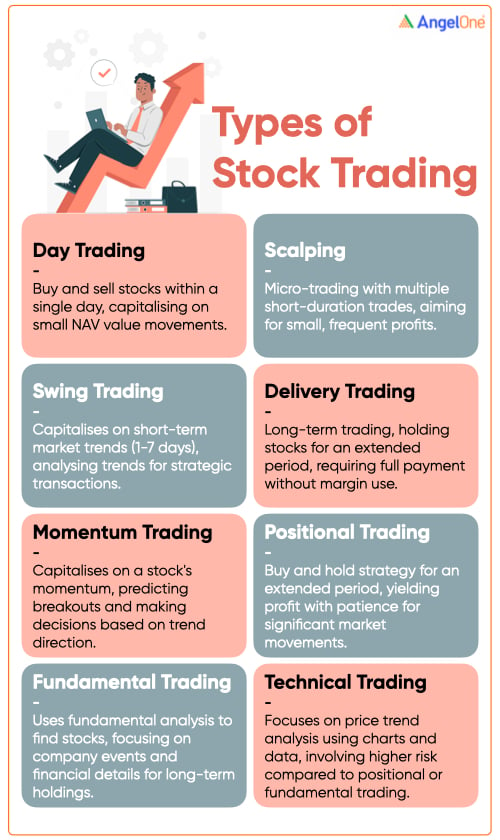In the dynamic world of finance, trading stands as a captivating pursuit where individuals and institutions engage in the buying and selling of assets, seeking to capitalise on the ever-shifting tides of the market. There are several trading types available in the stock market. Traders can choose a trading strategy based on their financial goals, the time they want to stay invested, risk tolerance and other factors. In this article, learn about stock trading, its types and more.
What Is Trading?
Trading is the cog that turns the wheel of the economy. Trading means exchanging goods and services between two or multiple entities against another product or money. Where trading takes place is called a market. There are organised and unorganised marketplaces. The organised market follows a set of rules and regulations to which every entity needs to adhere, and there are regulatory bodies supervising and maintaining market integrity. An unorganised market doesn’t have rules and governing bodies. In the stock market, trading refers to the buying and selling of equities of listed companies on the stock exchange. These shares trade in the primary and secondary markets.
History of Stock Trading
The history of stock market trading stretches back centuries. The first modern stock exchange emerged in Amsterdam in 1611, facilitating trade in Dutch East India Company shares. Communication advancements like telegraphs in the 19th century accelerated trading, while the 20th century saw the rise of floor traders shouting orders in chaotic pits. Today, electronic exchanges and algorithms dominate, enabling faster and more globalized trading.
Types of Trading in Stock Market
There are eight primary types of trading as follows:
-
Day trading
It involves buying and selling stocks in a single day. If the trader buys shares for intraday trading, they should also sell those at the end of the trading session. Day trading is famous for capitalising on small movements of the stock’s NAV value. Intraday trading is a relatively low risk since the trader holds the position for a short time. However, the risk can increase if the trade uses too much margin money.
-
Scalping
It is also called micro-trading because of the time involved in the trade. The trader will make several short-duration trades to reap small profits. The number of scalp trading can go from a few dozen to a hundred daily. Similar to day trading, scalp trading requires an understanding of technical analysis, market knowledge, proficiency, and awareness of price trends.
-
Swing trading
Swing traders capitalise on short-term market trends and patterns. In swing trading, a trade can last for a few days – from one day to seven days. It involves analysing the short-term trends to gauge market patterns to execute the transaction.
-
Momentum trading
In the case of momentum trading, traders capitalise on the stock’s momentum and select scrips that are either breaking out or will break out. Traders will base their trading decisions on the direction of the trend. For example, the trader will sell for a higher profit if the ongoing momentum is upward. Conversely, when the movement is downward, the trading strategy is to buy stocks at a lower price.
-
Delivery trading
It is the most prevalent trading style in the stock market and one of the most secure ways of investing. Delivery trading is a form of long-term trading where the investors buy stocks intending to hold onto them for some time. Delivery trading doesn’t allow the usage of margin. This type of trading requires investors to pay the total amount to acquire the stocks. Particular types of stock trading
-
Positional trading
Positional trading is a form of delivery trading called the buy-and-hold strategy. It requires traders to maintain their position for an extended period and ignore the slightest market movements. Positional trading yields profit when the trade waits for a significant period before selling off.
-
Fundamental trading
Traders use fundamental analysis of the company to find stocks. They pay special attention to events related to the company and its financial details. Fundamental traders hold their positions sufficiently long to allow the stock price to move significantly. The trading style is quite close to stock investment.
-
Technical trading
Unlike fundamental traders, technical trading focuses on price trend analysis. They use charts and data to time the market. The risk involved in technical trading is higher than positional or fundamental trading. Traders should have market knowledge and the ability to study charts and graphs for insights. 
How Online Trading Has Transformed Stock Trading?
Online trading platforms have made a significant contribution to popularising stock trading. It has made data and analysis more readily available to all participants on their mobile phones and laptops. The availability of different trading styles means traders can select the best-suited ones according to their profit target, risk tolerance, and investment objective.
Conclusion
Each stock trader has unique expectations for their invested money, making it clear that there is no universally best trading strategy for the stock market. However, it's crucial to recognise the trading style that suits your specific needs and preferences. Open your free trading account with Angel One in under five minutes and trade using our online trading tool from anywhere quickly and effortlessly. Happy Trading!

